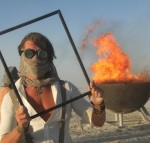Questions of a Columnist
When asked to write a column on arts and culture for the young professional, I was understandably hesitant: after all what authority do I have to pontificate on such haughty topics?
Especially after four years of law school and articling, neither of which are known for cultivating one’s artistic skill or sensibility. What would my views and opinions be but mere comments of a dilettante borrowed from something written by people much smarter than me (and usually much deader than me)?
And what would I write about? The encounters with art and culture (or some poor semblance of such) are common enough in our society, but a weekly meal at the Olive Garden does not make one a food critic, and surely the field of art and culture commentary ought to be left to those who dedicate their lives to the study of these sophisticated topics?
What do we, bumbling plebs, know of such things? Disheartened, I committed the idea of amateur cultural punditry to the dusty closet of “maybe-some-other-times”, next to the six-string and the yoga mat.
Epiphany of a Dilettante
A few weeks later – through an entirely unrelated matter – my spell-check picked up a mangled form of “dilettante”, which cursory led me to peruse the definition of the word. For those interested in etymology, here is what Concise Oxford Dictionary defines it as:
dilettante |ˌdiliˈtänt, -ˈtäntē|noun ( pl. dilettanti |-ˈtäntē| or dilettantes )– a person who cultivates an area of interest, such as the arts, without real commitment or knowledge;• archaic: a person with an amateur interest in the arts,
ORIGIN mid 18th cent.: from Italian, ‘person loving the arts,’ from dilettare ‘to delight,’ from Latin delectare .
Beyond Leonardo
We can all think of a quintessential Renaissance Man. Leonardo for example: painting with one hand, designing helicopters with the other, all the while indulging in enough esoteric philosophy to keep Dan Brown in the business of writing shitty books for at least another decade. Not on the same level of genius as Leonardo, but also worthy of mention are Lorenzo Medici penning sonnets and engaging in neo-Platonic discourses as an aside to refining world’s first system of international banking; or Henry VIII dabbling in physics, theology, and poetry, alongside more traditional kingly pursuits like drinking, whoring, tennis, and starting a new religion to spite the pontiff for excommunicating him over a messy divorce.
Jack of all Trades?
Yet the modern definitions of “dilettante” and “amateur” expose a different world view. A world view that values specialism – a thorough commitment to a narrow field – often at the high price of willful ignorance of all other intellectual pursuits. The trope of “jack of all trades” has become the adage for the view that wanting to learn everything results in knowing nothing. Anyone wanting to achieve success in life ought to not bother wasting time on anything beyond their specialist competence; it is best to leave such other fields to those who wish to pursue them with equal specialism.
The reasons behind this shift are manifold. My top suspects would be the fall of the classical humanist education (of the sort given to the civil aristocracy of the past), the market’s demand for narrow specialisation, and, most importantly, the ever-diverging and ever-deepening progress of all branches of science and technology.
If a well-read quattrocento alchemist could hope to master the entirety of then-existing human knowledge in a variety of topics, a gaggle of modern chemists from various sub-disciplines (quantum chemistry, neurochemistry, etc.) would have no hope of understanding each other’s fields, let alone those of modern mathematics or biology.
Looking to economic and scientific progress misses the Point
For most of us on the lower scales of the intellectual coefficient, it would be foolish to seek competence or professionalism across a variety of disciplines. Yet a dilettante does not claim either of those. A dilettante has interest, appreciation – yes and love – for various arts, sciences, humanities, and oddball pursuits.
A dilettante embraces the staggering multitude of topics, the joyous interaction of disciplines, and through the weaving of the many threads of knowledge and conversation, perhaps finds new meaningful relationships between them. And this is the exactly the sort of the multifaceted interest that seems to be atrophying from our society. Specialism is twice at fault here.
On the one hand, active dilettantism is often discouraged on an educational or professional level. On the other hand, those that want to dabble in different fields often grow frustrated by the obtuse writings of that discipline’s specialists who write for a narrow audience of other specialists – an academic circle-jerk if you will.
And this is why we need dilettantes. By approaching haughty topics in a light-hearted manner we encourage others to do the same, to venture outside of the narrow specialism, and to explore new vistas for which our thirsting minds yearn. Only by doing this can we hope to achieve an understanding of the world around us – ever-so complex and multidimensional. And only by doing this can we hope eventually cross that line from knowledge to wisdom.
So to hell with it. I’m going to embrace my dilettantism. I suggest you do the same.
A Caveat





